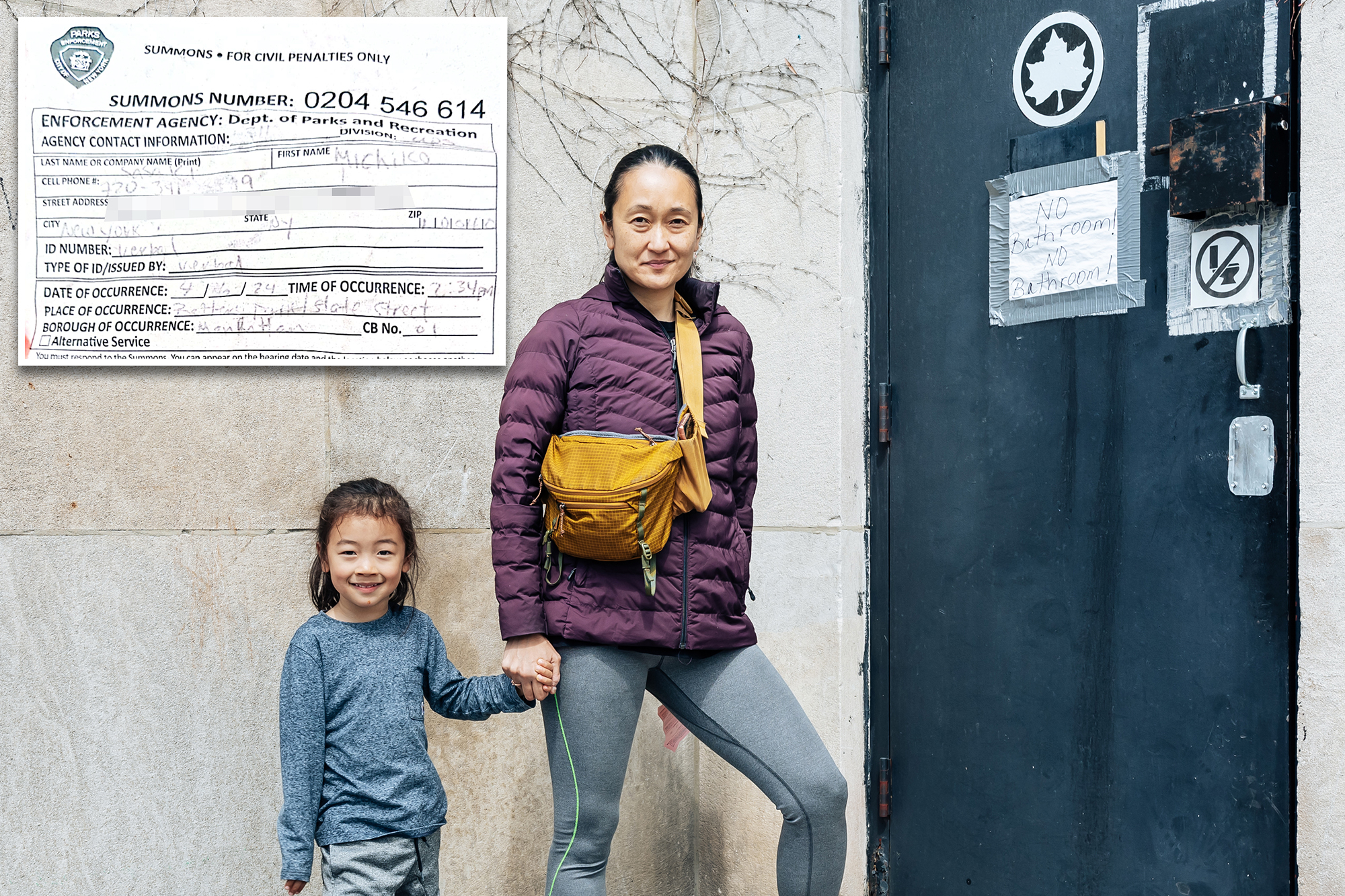
A spring day in the park was flushed down the toilet for a local mom after she was fined $50 for letting her four-year-old take an emergency wee outside.
Last Saturday, Michiko Sasaki, 46, and her young son, Kobe, were having a nice time at the Battery Playscape in Battery Park City when the boy suddenly had to go to the restroom.
Sasaki took him to the closest restroom in the park, but it was plastered with a sign reading “No bathrooms.”
She panicked. Kobe has anxiety issues and sensory processing disorder, a fairly common condition that affects how the brain receives and responds to information. It can sometimes cause Kobe to not be aware that he needs the bathroom until the very last minute.
“My son was like ‘I really need to go – I’m going to pee my pants,’” Sasaki, a professional dancer and actress who lives in Washington Heights, told The Post. It was “an emergency.”
Desperate, the fast-acting mom shielded her little boy as he pulled down his pants to quickly urinate.
Moments later, five or six parks officers approached Sasaki, and, she said, “hounded” her.
“I was bewildered and very confused. [One] aggressively told me that this was illegal and not okay to use the bathroom outside,” said Sasaki.
“He said, ‘Let me see your ID, I’m writing you a ticket.’ My jaw dropped – I was frozen. I didn’t know what to say. I said, ‘You’re writing me a ticket for what? You cannot have a playground and not have bathrooms.’”
Sasaki reluctantly complied and was handed a summons with a $50 fine, with a hearing date of July, 2.
“I did observe the respondent allowing her child to urinate on parks property, next to the public bathroom,” the summons, obtained by the Post, reads.
One of the officers questioned her parenting choices and motioned at a building — where the upscale restaurant The View is located — as somewhere she should have gone for a bathroom.
“They were extremely rude, they were very brash and diminishing. Phrases like, ‘how do you not get your child to go to the bathroom beforehand. He told me, ‘your child is old enough to hold it,’ ” said Sasaki, who noted that restaurants don’t typically want people who aren’t patrons using the bathroom.
It was, she said, “absolutely insane.”
But, she noted, it’s all too common in her her daily life.
“This is not just a Battery Park issue. As a parent, we struggle with public bathrooms every single day,” she explained.
Many restaurants, coffeeshops and bars that once allowed the public to use their restrooms no longer do.
Only food establishments that have 20 or more seats and opened after 1977 are required to have bathrooms for customers, according to the Official Website of the City of New York. Food establishments are not required to allow public access to their employee toilets, and customers cannot walk through food storage or prep areas to get to a bathroom.
A spokesperson for the New York City Parks Department told The Post two other public restrooms, located in the back of the concession building and on the North West corner of the park off Battery Place, were available for use last weekend.
“We want every New Yorker to be able to enjoy our parks and feel comfortable in them, which is why NYC Parks maintains more than 1,600 public restrooms across the five boroughs for the benefit of the public and the health of our city,” the spokesperson said. “Public urination in parks is prohibited, and we ask everyone to use the designated facilities provided.”
But, those alternative facilities were on the opposite side of where Sasaki and her son were playing — and, she said, none of the parks officers mentioned those restrooms as a potential alternative.
In 2017, New York City introduced the Criminal Justice Reform Act, which decriminalized petty offenses such as urinating in public. It’s now a civil offense, punishable with fines of up to $450, instead of criminal citations.
Sasaki is hoping to fight her ticket and not pay it.
“Sure it’s $50, and that’s not a lot, but it’s the principle. I’m not saying we should all go out and pee on the side walks, that’s not okay for adults,” she said. “However, it was a child in an emergency situation.”














